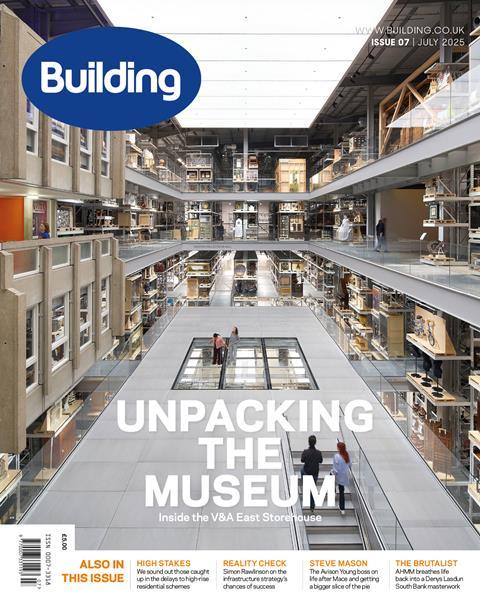Evidence being heard by a House of Lords inquiry exposes fundamental flaws that ministers still need to address

Timing is everything in politics. No surprise then to see the government announce a “package of reforms” targeting the much maligned Building Safety Regulator (BSR) at the tail-end of last month. This came just days after a House of Lords inquiry started hearing evidence about the chilling effect of the regulator on housing development, with Quintain’s boss Matt Voyce warning that crippling delays are deterring investors and risking jobs.
Shaking things up at the BSR is designed, according to the building safety minister Alex Norris, to “enhance operations, reduce delays and unlock the homes this country desperately needs”. Great, no need for the industry to keep banging on about delays at a Lords inquiry then, you could suggest. Well, it would seem there is plenty more to say on that point, as this week has shown, with industry experts continuing to provide peers with a piece of their mind.
First up was Mark Reynolds, co-chair of the CLC and executive chair at Mace, who was keen to explain the extent to which the industry has been trying to engage with the BSR and Norris. He mentioned regular meetings now taking place as well as guidance notes and action plans being considered.
He was diplomatic, of course, but at times he revealed hints of frustration at the lack of progress to date. Still, his focus is very much about making the current system work better by “getting through gateway 2 as quickly as possible without being […] reckless”.
The sheer scale of disruption caused by delays under the new regime is now prompting people to speak out
Criticisms on anything to do with building safety regulations are always very carefully caveated by construction and housebuilding professionals. No one wants to appear to oppose the spirit or the requirements of the Building Safety Act, ushered in to prevent another Grenfell disaster. And yet the sheer scale of disruption caused by delays under the new regime is now prompting people to speak out.
>> Also read: Is the government’s Building Safety Regulator shake-up enough to fix the delays?
Building has been gauging reaction to the recently announced reforms, which, to recap, entail moving the BSR across from the Health and Safety Executive to the MHCLG, changing the organisation’s figureheads and parachuting in an extra 100 technical staff with the promise of a “fast-track” approvals process. Everyone we spoke to felt these changes were barely scratching the surface of the problems. At best, the plans are said to be inadequate; at worst, they are dismissed as designed for show.
So let’s just run through some of the pain points the industry is feeling right now:
- Severe approval delays at gateway 2: signing off a project before it can start the construction phase was once promised to take 8 weeks; in reality, it can take anything up to a year. Data released by the consultant Cast after it submitted a freedom of information request showed that only about 10% of applications had been approved as of late June.
- Poor communication from the BSR: a bitter complaint is that projects are under pressure because of a notorious lack of communication from the regulator during the approvals process, which has been described as “radio silence”. Also identified is a lack of clarity over what applications are meant to contain to ensure compliance and an inconsistency in responses from the BSR’s multidisciplinary teams, leading to growing exasperation.
- Significant financial losses and viability issues: we have been told that delays are causing “incredible” amounts of money to be lost in potential revenue and jobs. This puts developers at financial risk, especially if they have multiple schemes stalled. Such delays are considered uninsurable and create a black hole in contractors’ ability to deploy teams and maximise their workforce.
All this pain is being experienced right now, and the ripple effects extend to companies right down the supply chain. And worse could still be in store in the form of gateway 3 approvals, which are needed before building occupation. Most projects in the system are not at this stage yet, but if delays at gateway 2 are replicated at this final stage Building was told there would be an “absolute crisis”.
Elsewhere in the policy arena the government has been positively hyperactive, reeling off its infrastructure strategy, industrial strategy and £39bn social and affordable homes programme in quick succession. Whitehall documents frequently mention “renewal” and pleasingly place construction and housebuilding at the very core of Labour’s growth agenda, but the rhetoric sounds increasingly hollow when another branch of government is blocking projects.
The Lords are encouraging industry experts to submit written evidence to their inquiry up until the end of August. It seems likely their request is pushing at an open door, with many frustrated professionals eager to share their pain as well as practical changes to reboot the system. Then it will be a question of whether ministers listen. They may have inherited this regulatory mess, but they will be judged on how successfully and speedily they can untangle it.
Chloë McCulloch is the editor of Building
Construction successes - the 2025 Building Awards shortlist

This challenging backdrop makes the achievements of this year’s Building Awards shortlist all the more impressive. The businesses and projects that make up our 2025 list of finalists reveal the breadth and depth of resilience in this vastly varied sector, and our 20 categories showcase what they have made possible over the past 12 months. We would like to congratulate them all on their efforts, and we look forward to celebrating everyone’s achievements at our awards ceremony on 4 November – go to our website to book a table!



























1 Readers' comment